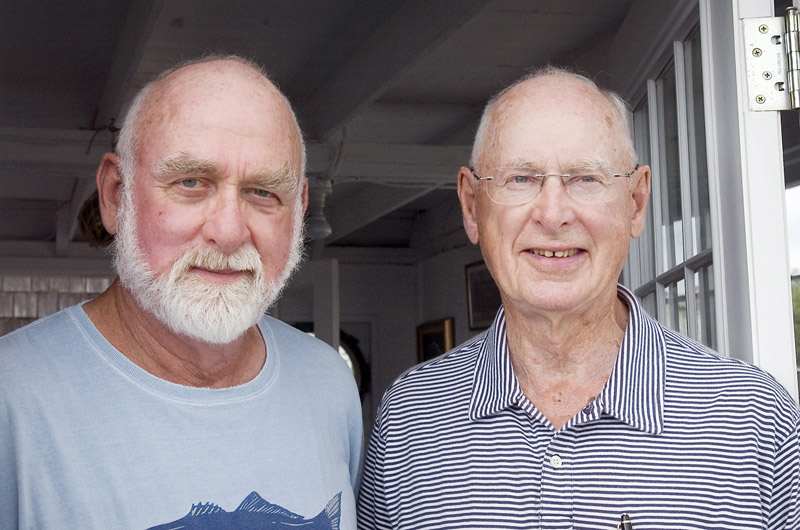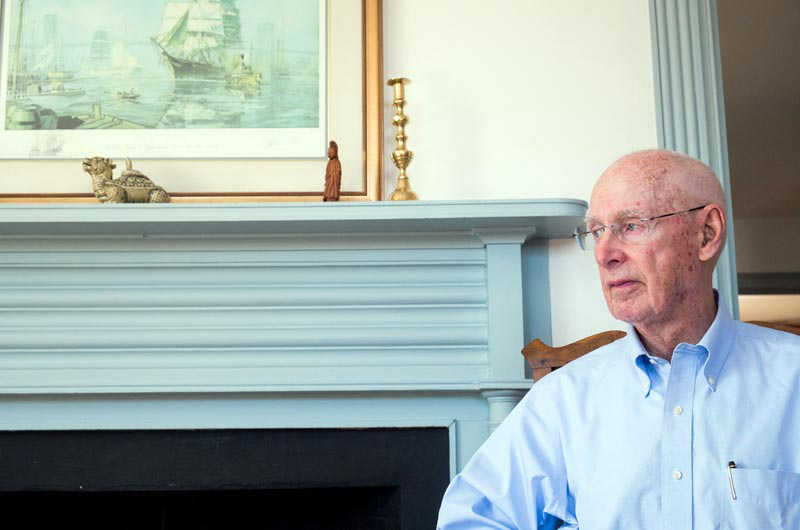S. Bailey Norton Jr., a 10th generation Islander and widely-admired Edgartown elder who was descended from a family of fishermen, sea captains and yachtsmen, died Sept. 8. He was 95.
A familiar figure on the streets of Edgartown, the town he loved, Mr. Norton was a naval veteran of World War II, author, retired business executive, past commodore of the Edgartown Yacht Club and lifelong chronicler of Island history.
His 2006 memoir, My Long Journey Home, A Life Worth Living, documents the people and scenes of the town.
“From day one my whole family was involved in fishing,” he told the Gazette in a 2014 interview. “I think that’s really all we knew.”
He was born in Edgartown and was the oldest living descendant of the first captain of the Charles W. Morgan whaleship — Capt. Thomas Adams Norton, who was his great-great uncle. He grew up in a house on Daggett street that is today the Anchors, home of the Edgartown Council on Aging. His father Samuel B. Norton, was a sailor and yachtsman who captained the Manxman, the largest cruising yawl in the world of its time.
In the Gazette interview, done on the occasion of the historic visit to the Vineyard by the whaleship Charles W. Morgan, he described life growing up in a seafaring town in the 1920s. Instead of a paper route, he had a fish route.
“Usually once a week, towards the end of the week, I’d buy fish from local boats or sometimes my grandparents or uncle,” he recalled. “I’d try to buy three boxes of codfish per week, 125 pounds to the box. I’d buy the fish for three cents a pound. I’d sell two boxes for a nickel a pound to the A&P and First National.”
It was an era when summer people walked on the harborfront side of Water street, while year-rounders walked on the inland side.
“The main thing here, when school let out at 3 o’clock in the afternoon, everyone immediately went to the waterfront. Either you were opening scallops, catching fish or selling fish,” he said.
As a child, his father would be gone for months at a time, sailing to the West Indies and Caribbean in the winter months. “I remember getting postcards from him all the way down to Trinidad,” he recalled. “He’d be gone for most of the year . . . . I didn’t see much of my father for the first 10 years of my life.”
After high school he did a post-graduate year at a military academy in New Jersey with the idea that he would enter the Naval Academy. Instead he enrolled at Worcester Polytechnic Institute on a full scholarship.
Following college, he moved to Ohio to work for Federal Machine and Welder, and when World War II began he enlisted in the Navy. He was shipping out to the Pacific when the atomic bomb was dropped on Hiroshima, ending the war.
He returned to civilian life and a long career in business, living for 30 years in South Hadley with his first wife Phoebe and their children.
Mr. Norton returned to the Island permanently in 1981, making his home on North Water street. Phoebe died in 1998 after a long illness; he later married his longtime companion Joan Wilson, who survives him.
He was active in civic affairs, especially in the areas of maritime history and historic preservation, including at the Martha’s Vineyard Museum and Martha’s Vineyard Preservation Trust.
About 15 years ago he singlehandedly led a successful effort to raise private and public funds to bury the power lines and replace streetlights on Edgartown’s North Water street with historically correct lamposts.
The project took years longer to complete than originally thought, partly because the utility giant NStar kept raising the price of the work. But Chris Scott, executive director of the Martha’s Vineyard Preservation Trust and a friend, recalled Mr. Norton would not be defeated.
“He was tenacious,” Mr. Scott said. “He put his reputation on the line with his neighbors and said let’s get this done — and he didn’t give up.”
Today, the handsome streetlamps cast their glow across the stately neighborhood of homes that once belonged to whaling captains.
“To some people it might seem like a little thing, but it wasn’t,” Mr. Scott said. “It was an enormous infrastructure improvement in the heart of the historic district on one of the most historic streets in the United States. It was a legacy.”
Mr. Norton was also instrumental in permanently protecting the family-owned Norton boathouse and old Obsorn building on the Edgartown harbor by transferring ownership to the preservation trust.
“It’s the only place on the harbor where a working waterfront business can afford to have boat space and a store — Bailey made it that way,” Mr. Scott said.
Most recently, he assisted with the ongoing project to convert the Carnegie building on North Water street to a maritime visitor center. Mr. Scott said Mr. Norton has donated some valuable historical maritime artifacts, including a half model of the Progress, the swordfishing boat owned by Mr. Norton’s grandfather, Capt. Robert Jackson, that was famously sunk by a German submarine on Georges Bank.
“For me, he was really an inspiration, a mentor and a true friend. It was a privilege to work with him,” Mr. Scott said.
Matthew Stackpole, a West Tisbury maritime historian who formerly headed the Martha’s Vineyard Museum and was ship historian for the Charles W. Morgan project, concurred. “One of the great people — a remarkable man with incredible integrity, a sense of place and values,” he said. “You couldn’t be in the room with Bailey without learning something about Edgartown and the history of the town.”
He said Mr. Norton visited Mystic Seaport some years ago when the whaleship project began and inspired all who met him. “The folks in Mystic loved him,” he said, adding:
“Think of what he did for the town. It was all about respecting the past and using it as a basis for the way he lived.
“You can’t replace people like Bailey — all you can do is be inspired by them. It’s a star to steer by.”
The Rev. John Schule presided over a graveside service at noon last Sunday, which drew about 200 mourners to the New Westside Cemetery in Edgartown. As he began his remarks, the heavens opened for brief downpour. Edgartown poet laureate Steve Ewing read two poems and Mr. Norton was honored with a full military salute.
In the Gazette interview, he recalled the joy of coming home.
“All my working years I looked forward to coming home and having my own boat and being able to get on the water. It’s the best place of all,” he said.






Comments (3)
Comments
Comment policy »